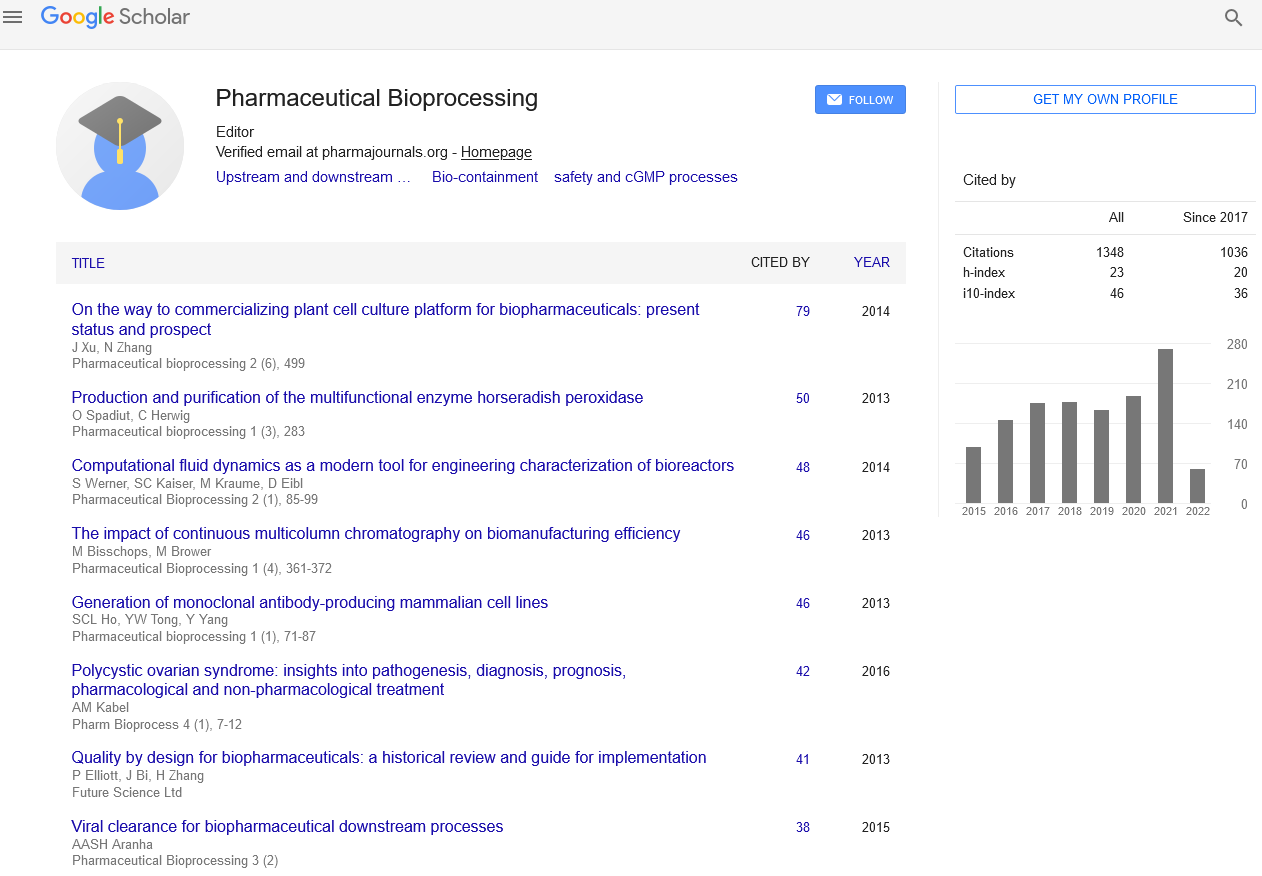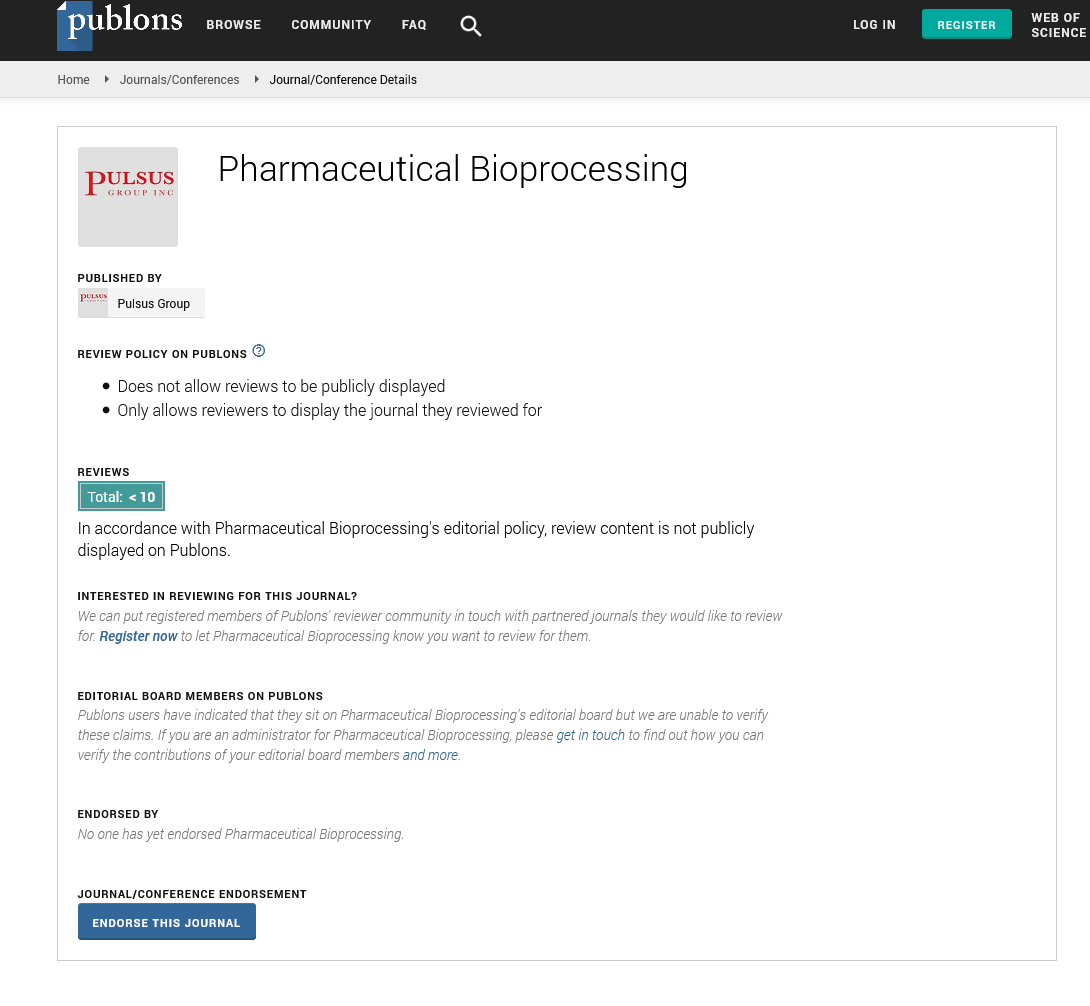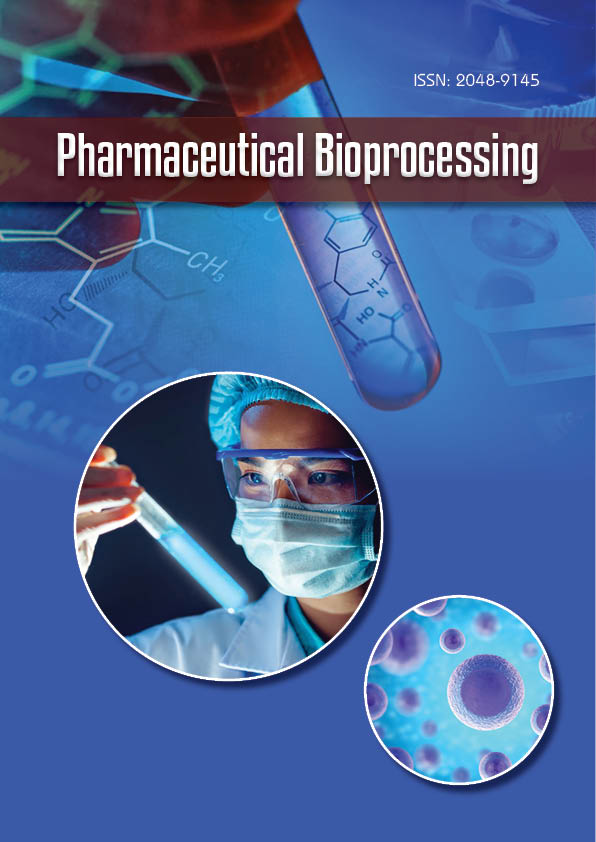Perspective - Pharmaceutical Bioprocessing (2024) Volume 12, Issue 1
Harnessing the Power of Antibodies: The Rise of Antibody Drugs in Modern Medicine
- Corresponding Author:
- Herbert Dichtel
Department of Pharmacy,
Biotech Pharmaceutical Center,
Boca Raton,
United States
E-mail: herbert_dichtel@biotest.de
Received: 08-Jan-2024, Manuscript No. FMPB-24-127226; Editor assigned: 11-Jan-2024, PreQC No. FMPB-24-127226 (PQ); Reviewed: 25-Jan-2024, QC No. FMPB-24-127226; Revised: 13-Feb-2024, Manuscript No. FMPB-24-127226 (R); Published: 20-Feb-2024, DOI: 10.37532/2048-9145.2024.12(1).150-151
Introduction
In the dynamic landscape of modern medicine, antibodies have emerged as powerful therapeutic agents, revolutionizing the treatment of a wide range of diseases, from cancer and autoimmune disorders to infectious diseases and rare genetic conditions. Antibody drugs, also known as biologics or monoclonal antibodies, offer targeted and precise therapies with fewer side effects and greater efficacy than traditional pharmaceuticals. In this article, we delve into the intricacies of antibody drugs, exploring their significance, mechanisms of action, and transformative impact on healthcare and society.
Description
Unraveling the essence of antibody drugs: Nature’s precision tools
At the heart of antibody drugs lies the remarkable specificity and versatility of antibodies, which are specialized proteins produced by the immune system to identify and neutralize foreign invaders such as bacteria, viruses, and cancer cells. Antibodies work by binding to specific targets, known as antigens, with high affinity and selectivity, triggering immune responses such as cell lysis, phagocytosis, or modulation of signaling pathways.
Antibody drugs harness this natural defense mechanism by engineering monoclonal antibodies that target specific antigens implicated in disease pathogenesis. These engineered antibodies are designed to bind to disease-specific t argets, s uch a s t umor a ntigens, i nflammatory cy tokines, or viral proteins, with high affinity and specificity, thereby modulating disease pro cesses and restoring immune homeostasis. The journey begins with the identification of disease-relevant antigens and the generation of monoclonal antibodies through techniques such as hybridoma technology, phage display, or transgenic animal models. Once a lead candidate is selected, it undergoes rigorous preclinical testing to evaluate its safety, efficacy, and pharmacokinetics in animal models.
The mechanisms of action: How antibody drugs work
Antibody drugs exert their therapeutic effects through a variety of mechanisms, depending on the target antigen and the intended therapeutic outcome. One common mechanism is blockade of receptor-ligand interactions, where antibodies bind to cell surface receptors or soluble ligands, preventing them from interacting with their cognate receptors and activating downstream signaling pathways.
Another mechanism is Antibody-Dependent Cellular Cytotoxicity (ADCC), where antibodies bind to target cells expressing specific antigens, such as tumor cells, and recruit immune effector cells such as Natural Killer (NK) cells or macrophages to induce cell lysis and apoptosis. Similarly, Antibody-Dependent Cellular Phagocytosis (ADCP) involves the opsonization of target cells by antibodies, facilitating their recognition and engulfment by phagocytic cells such as macrophages.
Applications of antibody drugs: Transforming treatment paradigms across diseases
Antibody drugs have transformed the treatment landscape across a wide range of diseases, offering targeted therapies with fewer side effects and greater efficacy than traditional pharmaceuticals. In the field of oncology, antibody drugs such as trastuzumab (Herceptin) and rituximab (Rituxan) have revolutionized the treatment of breast cancer and lymphoma, respectively, by targeting tumor-specific antigens and inhibiting tumor growth and metastasis.
Moreover, antibody drugs such as pembrolizumab (Keytruda) and nivolumab (Opdivo) have emerged as powerful immunotherapies for the treatment of various cancers, by targeting immune checkpoint inhibitors such as programmed cell death protein 1 or Programmed Death-Ligand 1 (PDL1), thereby unleashing anti-tumor immune responses and improving patient outcomes.
Challenges and future directions: Navigating the frontiers of antibody drug development
While antibody drugs hold immense promise, they also face several challenges that must be addressed to fully realize their potential. One key challenge is optimizing the pharmacokinetics, stability, and immunogenicity of antibody drugs, to ensure optimal efficacy and safety in clinical use. Strategies such as antibody engineering, glycoengineering, and formulation optimization are being explored to enhance the pharmacokinetic properties and reduce the immunogenicity of antibody drugs.
Moreover, the high cost and complexity of antibody drug development present barriers to access for patients in need, particularly in developing countries. Addressing these challenges requires collaboration among industry stakeholders, regulatory agencies, and advocacy groups to develop innovative solutions that improve affordability, accessibility, and equity in healthcare. Looking ahead, the future of antibody drugs holds exciting opportunities for innovation and advancement. Advances in antibody engineering, protein engineering, and immunotherapy are expanding the capabilities of antibody drugs and improving their therapeutic potential across a wide range of diseases.
Moreover, the emergence of novel platforms such as bispecific antibodies, antibody-drug conjugates, and immune engagers offers new avenues for enhancing the specificity, potency, and versatility of antibody-based therapies. By leveraging these innovations, researchers and industry stakeholders can unlock new frontiers in antibody drug development and transform the treatment paradigm for patients worldwide.
Conclusion
In conclusion, antibody drugs represent a paradigm shift in modern medicine, offering targeted and precise therapies for a wide range of diseases. As we continue to unravel the complexities of antibody biology and drug development, collaboration, innovation, and forward-thinking will be key to unlocking the full potential of antibody drugs and shaping a healthier, more equitable future for humanity.


